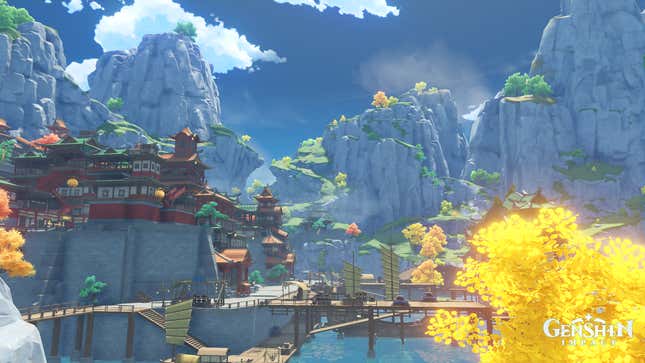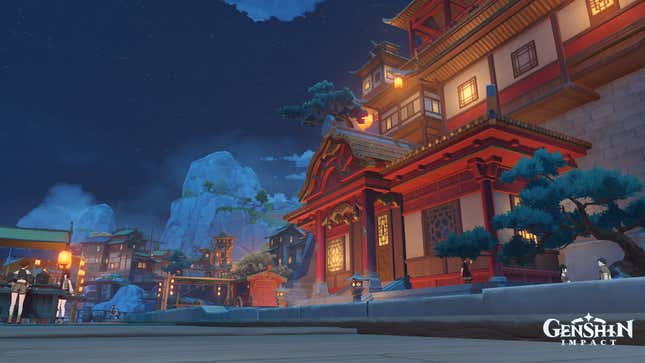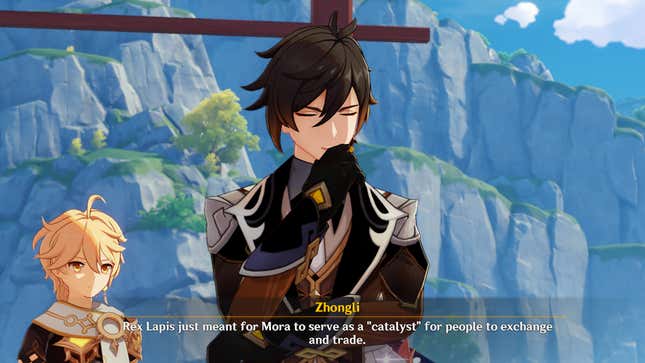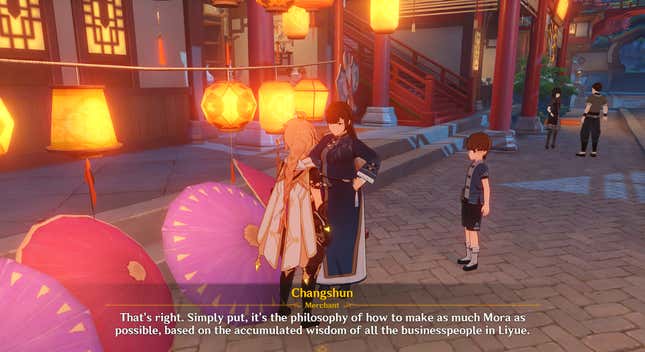
Genshin Impact has one of the most exciting regions that I’ve visited in a video game in years. It’s called Liyue and its geological and agricultural bounty is distinct from other open world games. To the west, a traveller can find gorgeous cliffs of ashy stone and golden amber. In the east, rugged archipelagos mark the spots where the spears of an ancient god pierced the ocean.
When I look at this landscape, I do not know the austere mountains that connect the earth to the heavens nor the terraced rainbow fields of Qingce, but I find a comforting familiarity with a part of Liyue. I find it in Liyue Harbor and its population of eagle-eyed dealers and the nagging hawkers. When I walk my character up to a jade merchant who assures me that his first offer is the best one, I smile and nod in front of my monitor. It’s a familiar lie that I’ve experienced in person.
That “best offer” is the first move in a familiar dance that I used to perform at the markets in Beijing. Expert buyers would tell white lies to knock a price down to its most agreeable point. I remember watching older ladies insult the quality of what they were looking to buy, or imply that it was unfashionable. Devaluing a seller’s wares was as fair a tactic as threatening to walk away from a sale. Property developers would eventually tear many of these markets down and build gleaming shopping malls in their place. As a result, my hometown no longer feels like it belongs to me. Now, it belongs to faceless corporations such as Victoria’s Secret and The Gap. Instead of haggling for the best deal, I pay prices that were decided by a bunch of suits in a steel tower somewhere. When I opt to pay in cash instead of WeChat Pay, the confused cashiers scramble for a manager. As an American who spends most of my time abroad, perhaps I am the archaic lord in my own story.
I can never go home to a past that no longer exists, but I can get pretty damn close in Liyue.


Farewell, Archaic Lord is a major story chapter in Genshin Impact, and it’s a fascinating story about how a god tests whether or not his patron city can survive without his protection. After faking his own death and taking on the guise of Zhongli, Rex Lapis guides the player through preparing for his own funeral. This is not the player’s story: this is a story about whether or not the city will renew their contract with the Adepti gods after 3,700 years of cooperation, or if they will embark on their own path. The implications of their decision will have permanent consequences, as the humans in Liyue had always relied on the Archon’s divine judgement to bring them prosperity. There is only one thing that could compel Liyue’s shrewd leader Ningguang to give up Liyue’s most potent contract with the Adepti gods: guanxi.
Guanxi is literally Chinese for “relationships,” except it carries a lot more obligations than the more shallow relationships that I have experienced with the locals in North America. Contrary to what some business hacks might tell you, guanxi is not some kind of sinister instrument of Eastern nepotism. Giving your friends and family special business advantages isn’t uniquely Chinese, either (I’m looking at you, Greek letter organizations). But what I do find very Chinese is the firm assumption—expressed through guanxi—that no good turn should go unrewarded. To neglect a favor is to violate the very basis of the social contract. And so it is this system that allows Liyue to thrive, despite the merchants’ obsession with accumulating wealth.
It is guanxi that compels the conniving jade merchant to sell his jade to the player at a loss. He had fought tooth and nail to secure the best possible terms for the sale, but he forfeits all of the profit when he hears that the jade was intended for his patron deity’s funeral. Rex Lapis had once helped spread word of his business, and he felt that he owed a requited debt (renqing) to his lord. While he is an exceptional citizen of the city, the game insists that anyone would have done the same. The fictional city of Liyue is an idealized place where reciprocity is king, as surely as chivalry would reign in any fictionalized European city.

The patron god himself would remark that money (Mora) only serves as a catalyst for exchange, and holds no inherent value. Despite its natural bounty and geographic advantages, the real strength of Liyue is in people’s ability to uplift each other through cooperation. As the leader of Liyue, Ningguang does not renew the city’s divine contract, because she believed that the everyday cooperation between the city’s residents made the city equal to the gods. She notes that the restaurateur Xiangling does not like her, but she was the patron who had funded her restaurant. Whatever their personal differences may be in temperament or status, that act of bankrolling Wanming created a connection between two dissimilar people. Similarly, Ningguang has exchanged her beloved Jade Chamber as a part of her larger negotiations with the Adepti. When people pool their money and resources, they are able to accomplish more than they could on their own.
Guanxi does not only apply to business. It also applies to community. Mutual aid relationships are the reason why many Chinese diaspora communities were able to survive in countries where they did not speak the local language. I spent my childhood running errands for Chinese strangers whose names I did not know, all because my parents owed them a mutual favor (renqing) and wanted to cultivate the relationship (guanxi). I didn’t need to know who these people were, or what their backstory was. I was only repaying a favor that may have occurred before I even learned how to walk. When the jade merchant in the game wanted to repay a favor on behalf of his long-dead predecessors, I immediately understood why it was important to him. I now resist fulfilling other people’s debts, but I know the weight of obligation. Even after I watched immigrant fortunes stabilize, adults from the mainland would speak of guanxi and renqing in the same breath: an inviolable expression of our shared humanity.
Many people in the Chinese diaspora dislike each other. I have heard my share of petty slander about so-and-so’s airheaded son or how garish someone’s dress looked at a pre-pandemic potluck. Nevertheless, communities thrive because of the endless exchange of favors. Similarly, the contracts in Liyue are powerful because they don’t require all parties to like each other. In order to facilitate the deception about his death, Rex Lapis collaborated with the nefarious Fatui (an enemy faction in Genshin Impact). A fair exchange is able to grease wheels when words, similarities, and diplomacy fail.
The game isn’t completely idealistic about these economic relationships, either. An economic system based on social relationships isn’t completely foolproof, because it leaves out people on the margins. When the player boards Liyue ships, they are tasked with obtaining an invitation. And no one is jumping at the opportunity to extend help to a stranger. While walking by the harbor, I overheard one restaurant owner berate a waitress for serving the customers at a fair price. He talked about watering down the wine and halving portion sizes. A businesswoman explained that she was looking to maximize profit with mercantilism. The game does not shy away from critiquing Liyue’s society, as it only functions if people were able to put integrity above profit. It’s an incredibly idealistic and often impossible ask, and the text is highly self-aware about its own limitations.The finale of the Liyue chapter only presents one story in which social reciprocity could save humanity. Genshin Impact allows just enough breathing room in the story to allow us to wonder: could there be alternative outcomes? Or would the merchants’ greed lead to the city’s downfall?

Most people today live in societies where their shopping habits are largely divorced from their communities. Walmart crushes competitors with purchasing power. Amazon’s existence has closed independent bookshops. Large conglomerates do not think about their customers in terms of mutual benefit.
But in Liyue’s society, money is capable of building interdependence. Genshin Impact shows an idealized portrayal of Chinese social relations that exists in localized pockets. Liyue is not simply a pretty region to explore. To me, it is yearning for an idealized society where merchants and customers express their care for one another through patronage and investment. Players can meet several foreign visitors who express love and admiration for Liyue, but it is a fleeting and shallow love. Love is where you choose to build your fortune, and whose livelihood you support. The residents of this port city understand this love well. The mega malls in my hometown are devoid of this love, but precarious Chinese people continue to keep this love alive.
Sisi Jiang is a game designer who prefers making games over writing about them.